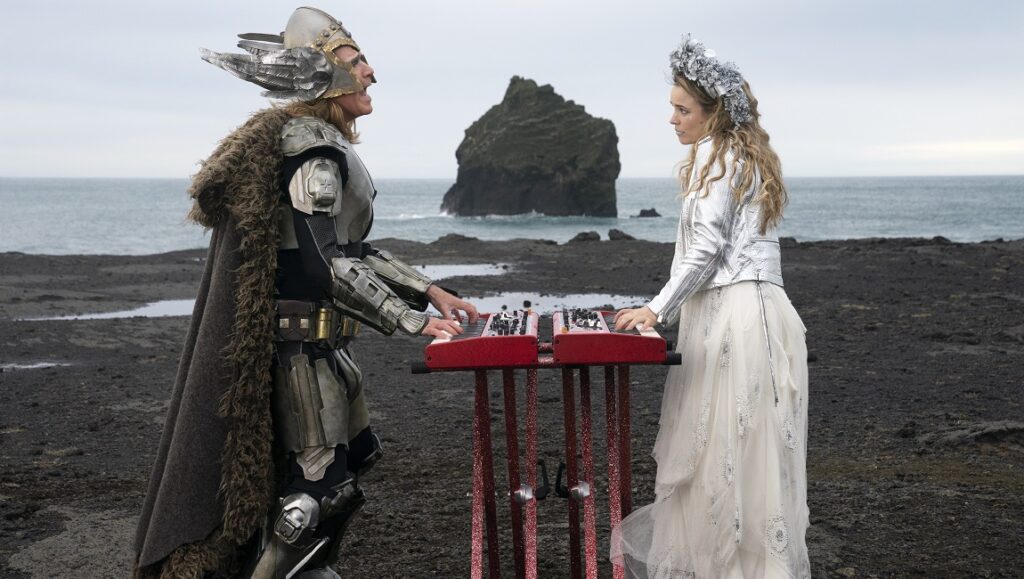There is more than a bit of irony to be found in the fact that the new Will Ferrell/Netflix comedy Eurovision Song Contest: The Story of Fire Saga is being released in 2020, the first year since the singing competition’s inception in 1956 that it isn’t taking place (it was canceled due to COVID-19). That the events within the film happen to occur specifically at the 2020 ceremony is, while ultimately not all that important, a strange bit of bad timing. But then, the film largely feels like a product from another era, specifically the early 2000s, when American Idol and later Glee dominated television screens and Will Ferrell was a box office king. And while most Americans are probably unfamiliar with the titular contest, they no doubt will still feel a sense a déjà vu when watching the film, which cycles through the same tired beats of the majority of Ferrell’s starring vehicles. But Eurovision is also a bit weirder than that suggests. Those looking for the broad hijinks and uncorked mania of Ferrell’s 2000’s run may be disappointed to discover that this plays more like a cousin to the actor’s completely poker-faced Lifetime TV-movie A Deadly Adoption. Ferrell has always excelled at playing the clueless buffoon, and while that description still readily applies to his character here of Lars Erickssong, a struggling Icelandic singer who has dreamed since childhood of performing at Eurovision with his best friend/potential love interest/possible sister Sigrit Ericksdottir (Rachel McAdams), this could quite possibly be one of the most subdued performances of the actor’s career — excepting a scene or two — and it suits him.
Those looking for the broad hijinks and uncorked mania of Ferrell’s 2000’s run may be disappointed to discover that this plays more like a cousin to the actor’s completely poker-faced Lifetime TV-movie A Deadly Adoption.
As is typical with films of this ilk, the plot is almost beside the point and mostly inevitable: against all odds, the singing duo make it to the big competition and fall in love along the way. The real ace up this film’s sleeve is McAdams, who proved with 2018’s one-two punch of Game Night and Disobedience, a pair of films that couldn’t be more tonally dissimilar, that she is one of the best actresses working, in possession of a range that has never gotten the proper recognition. In Eurovision, she is an absolute delight, somehow bringing surprising depth and dimension to a character that talks to murderous elves and, at one point, gets dragged across a concert stage by a giant hamster wheel. That it takes Lars so long to fall in love with McAdams’ endlessly charming Sigrit is the film’s most unbelievable development, and this is a movie that features Demi Lovato as a flaming ghost with a missing arm. The price of the film’s gag-heavy nature is a 123-minute runtime that feels as overlong as its title, and while director David Dobkin (most notable in the rom-com realm for Wedding Crashers) brings polish enough to the absurdist proceedings, he is unable to fully overcome this bloat. Perhaps the film didn’t need Pierce Brosnan as Ferrell’s disappointed father, or Dan Stevens as a closeted Russian singer obsessed with jungle cats, or 238 musical performances. But those elements are also part of the maximalist charm of Eurovision Song Contest: The Story of Fire Saga; it dances, enthusiastically, to the nostalgic beat of its own, aughts-era drum. If you don’t think a joke where the characters perform a “song-a-long” is funny, it’s probably best if you look for a different way to spend two hours.
You can currently stream David Dobkin’s Eurovision Song Contest: The Story of Fire Saga on Netflix.


Comments are closed.